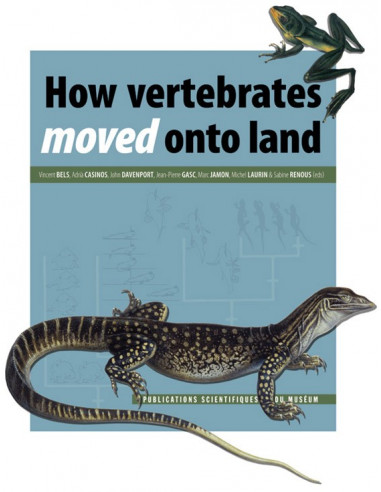Paiement sécurisé par 3D secure. Aucune information bancaire n'est stockée.
Livraison sous 48h ouvrées du lundi au samedi pour la France métropolitaine
Équipe à votre écoute par téléphone au 04.67.18.65.39 et par mail à leclub@biotope.fr
Among vertebrates, the evolutionary transition from an aquatic or amphibious to a fully terrestrial life seems to have occurred potentially more than once within the clade. These events probably occurred in the Carboniferous. New selective pressures faced by the first amphibious or terrestrial vertebrates due to environmental constraints in their new environments generated drastic changes in locomotor structures, performances and strategies in vertebrates.
To explain "how vertebrates moved onto land", this volume presents a comparative investigation of locomotion, from structure to motor control, in fossil and living groups. The present volume provides an up-to-date integrative study on these, based on morphology, physiology, palaeontology, biomechanics, behavioral ecology, and neurobiology. The first paper shows how the hypotheses about transition changed through time. The two following papers show how our knowledge of locomotor structures of vertebrates suggests a possible scenario explaining this evolutionary transition.
However, locomotor performance and motor control in extinct taxa can be inferred only from extensive analysis of locomotor modes (i.e., walking, trotting, running, jumping, hopping) in recent organisms relevant to the evolutionary transition from water to land. In three other papers, locomotor performances are studied through comparative approaches in fully aquatic vertebrates, in vertebrates transitorily inhabiting terrestrial environments, and in vertebrates which have definitively passed through the transition to permanently terrestrial occupation.
CD-Rom of the volume provided
- EAN
- 9782856536674
- Editeur
- Publications scientifiques du MNHN
- Auteur
- Vincent Bels, Adrià Casinos, John Davenport, Jean-Pierre Gasc, Marc Jamon, Michel Laurin, Sabine Renous (eds)
- Type de couverture
- Rigide
- Parution
- 2011
- Nombre de pages
- 200
- Largeur (en cm)
- 22
- Longueur (en cm)
- 28
- Poids (en kg)
- 1,5
- Langue
- Anglais




